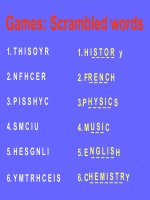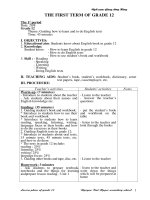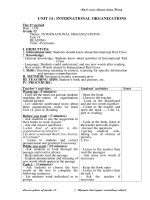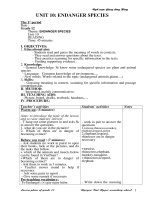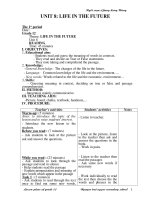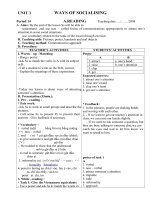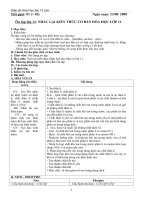Unit 14 - 12 CB
Bạn đang xem bản rút gọn của tài liệu. Xem và tải ngay bản đầy đủ của tài liệu tại đây (119.24 KB, 11 trang )
Date of preparing: /..../200 ..…… …
Date of teaching: / ./200 .. …… … …
Class: ………………
Unit 14
International organizations
---------------oOo-------------
Period N
o
84 - Lesson 1: Reading
I. Objectives:
1. Educational aim:
- Students should know about International Red Cross
2. Knowledge:
- General knowledge: Students know about activities of International Red Cross
- Language: Students could understand and use new words after reading
- New words: Words related to International Red Cross
3. Skills:
- Guessing meaning in context, scanning for specific information and passage comprehension
II. Method:
- Integrated, mainly communicative
III. Teaching aids:
- Student’s book and pictures, etc.
IV. Procedure:
Time
5
3
5
2
Teacher s activities
- divide the class into 2
groups.
- stick the symbols/
logos of the
International
Organizations to the
board.
- distribute the cards of
the name of the
International
Organizations to the Ss:
WWF, UNESCO,
UNICEF, WHO, UN,
FIFA.
- call out the symbols
in any order and the
representatives of each
group should run to the
blackboard and tick the
names under the
symbols.
- check Ss
understanding of the
instructions
- declare the winner.
- ask Ss to work in
pairs to look at picture
and answer the
questions.
- go round to listen to
Ss.
- call some pairs to
answer.
- read word by word.
- ask Ss to repeat in
chorus and individual
and write them on the
blackboard.
- say some words in
English and ask Ss to
speak them out in
Content
A. Warm- up: Matching game:
B. Pre- reading:
I. Look at the picture and answer the
questions
Suggested answers
1.giving medical aids-taking care of
victims of poverty
2. Yes
II. Vocabulary:
- to dedicate (v) ['dedikeit] : hiến dâng, cống
hiến
- to initiate (v) [i'niiit] : khởi xớng, bắt đầu
- to appeal (v) ['pi:l] : kêu gọi, yêu cầu
- to appal (v) ['p:l]: làm cho ai phát hoảng,
làm xúc động
- to result (v) [ri'zlt] : dẫn đến, gây ra
- disaster- stricken (adj) [di'z:st-'strikn]
: bị thiên tai tàn phá
- epidemic (n) [,epi'demik] : dịch bệnh, nạn
dịch
- civilian (n)[si'viljn]: thờng dân
- tsunami (n) [tsu'na:mi] : sóng thần
- to wash away [w 'wei] : quét sạch
III. Check vocabulary
C. While- reading
Students activities
- work in 2 groups.
- look at the symbols/
logos of the
International
Organizations on the
board.
- receive the cards of
the name of the
International
Organizations to the
Ss: WWF, UNESCO,
UNICEF, WHO, UN,
FIFA.
- the representatives of
each group runs to the
blackboard and ticks
the names under the
symbols.
- the group with more
correct answers will
win.
- look at picture and
answer the questions.
- some pairs answer.
- listen carefully
- repeat after the
teacher in chorus and
individual and write
down.
- do the task
individually.
Date of preparing: /..../200 ..…… …
Date of teaching: / ./200 .. …… … …
Class: ………………
Unit 14
International organizations
---------------oOo-------------
Period N
o
85 - Lesson 2: Speaking
I. Objectives:
1. Educational aim:
- Students could ask and answer about international organizations in the world
2. Knowledge:
- General knowledge: By the end of the lesson students can practise a dialogue about some
international organizations
- Language: asking for and giving information from a passage
- New words: words related to the topic
3. Skills:
- talking about international organizations and their activities in charity and volunteer work
II. Method:
- Integrated, mainly communicative
III. Teaching aids:
- Pictures, textbook,....
IV. Procedure:
Time
3’
3’
9’
20’
Teacher s activities’
- ask Ss to look at the
logos and match them
with the organizations
they stand for.
- ask Ss to work
individually.
- check the answers
with the whole class.
- comment and give
correct answers.
- lead in the new
lesson.
- read word by word.
- ask Ss to repeat in
chorus and individual
and write them on the
blackboard.
- ask Ss to read the
passage and answer the
questions about WHO.
- let them work in
pairs.
- ask some pairs to ask
and answer in front of
the class.
- listen to Ss and
correct mistakes.
- ask Ss to work in pairs
to talk about the
information about
UNICEF and WWF.
- give some special
expressions
- walk round and help
them.
- ask some Ss to stand
up to talk again loudly.
- listen and correct
mistakes.
Content
A. Warm- up : Matching the logos with
the organizations they stand for:
1. WWF 2. UNICEF 3. WHO
A B
C
Answers:
1. B
2. A
3. C
B. Pre- speaking:
I. Vocabulary:
- attainment (n) [ə'teinmənt] : viÖc ®¹t ®îc
- to advocate (v) ['ædvəkit] : t¸n thµnh, ñng hé
- fund (n)[fʌnd]: quü
II. Task 1:
Answers:
1. WHO stands for World Health
Organization.
2. It was established on 7 April 1948
3. Its major objective is the attainment by
all peoples of the highest possible level of
health.
4. Its major activities are carrying out
research on medical development and
improving international health care.
C. While- speaking:
I. Task 2:
Special expressions:
- Could you tell me when/ where .?………
- What are its main aims?
- What about its objectives?
Model:
- A: I’m searching some information about
UNICEF .Could you tell me some?
- B: Well, UNICEF stands for the United
Nations International Children’s Emergency
Fund
- A: When was it founded?
- B: In 1948 in New York.
- A: What about its aims?
Students activities’
- look at the logos and
match them with the
organizations they
stand for.
- work individually.
- listen carefully
- repeat after the
teacher in chorus and
individual and write
down.
- read the passage and
answer the questions
about WHO.
- work in pairs.
- some pairs ask and
answer in front of the
class.
- work in pairs to talk
about the information
about UNICEF and
WWF.
- note down.
- some Ss stand up to
talk again loudly.
Date of preparing: /..../200 ..…… …
Date of teaching: / ./200 .. …… … …
Class: ………………
Unit 14
International organizations
---------------oOo-------------
Period N
o
86 - Lesson 3: Listening
I. Objectives:
1. Educational aim:
- Students should listen and give information about United Nations Organization
2. Knowledge:
- General knowledge: Students learn more about United Nations
- New words: Words related to United Nations
3. Skills:
- Listening and comprehension questions
- Listening and deciding on True or False statements or no information
II. Method:
- Integrated, mainly communicative
III. Teaching aids:
- Student’s book, pictures . ………
IV. Procedure:
